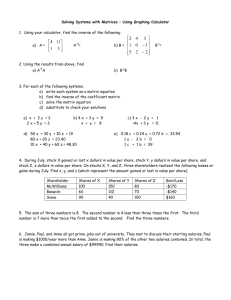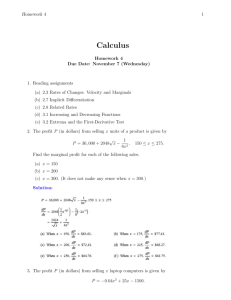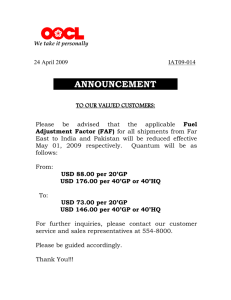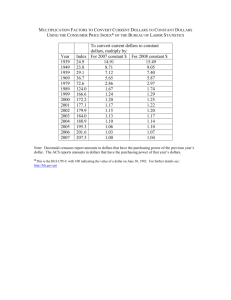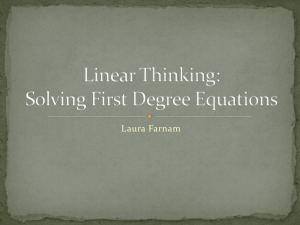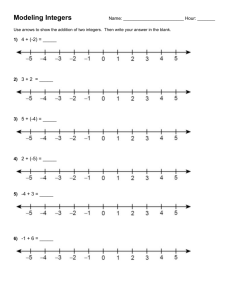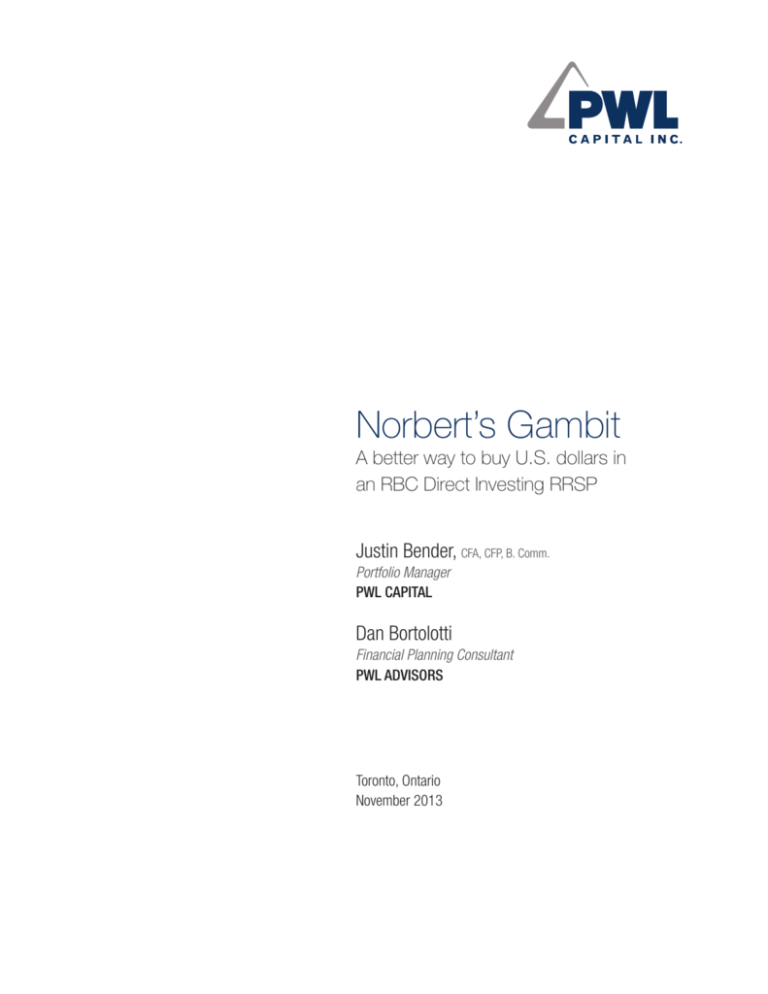
Norbert’s Gambit
A better way to buy U.S. dollars in
an RBC Direct Investing RRSP
Justin Bender, CFA, CFP, B. Comm.
Portfolio Manager
PWL CAPITAL
Dan Bortolotti
Financial Planning Consultant
PWL ADVISORS
Toronto, Ontario
November 2013
This report was written by Justin Bender, PWL Capital Inc. and Dan Bortolotti, PWL Advisors Inc.
The ideas, opinions, and recommendations contained in this document are those of the authors and
do not necessarily represent the views of PWL Capital Inc.
© PWL Capital Inc.
All rights reserved. No part of this publication may be reproduced without prior written approval of
the author and/or PWL Capital. PWL Capital would appreciate receiving a copy of any publication or
material that uses this document as a source. Please cite this document as:
Justin Bender, Portfolio Manager, PWL Capital Inc. and Dan Bortolotti, Financial Planning Consultant,
PWL Advisors Inc. “Norbert’s Gambit: A better way to buy U.S. dollars in an RBC Direct Investing
RRSP”
For more information about this or other publications from PWL Capital, contact:
3 Church Street, Suite 601, Toronto, Ontario M5E 1M2
Tel
416 203-0067 • 1-866 242-0203 Fax 416 203-0544
toronto@pwlcapital.com
This document is published by PWL Capital Inc. for your information only. Information on which this document is based is available on request. Particular investments
or trading strategies should be evaluated relative to each individual’s objectives, in consultation with the Investment Advisor. Opinions of PWL Capital constitute its
judgment as of the date of this publication, are subject to change without notice and are provided in good faith but without responsibility for any errors or omissions
contained herein. This document is supplied on the basis and understanding that neither PWL Capital Inc. nor its employees, agents or information suppliers is to be
under any responsibility of liability whatsoever in respect thereof.
US-listed ETFs are the most tax-efficient way to invest in foreign equities within your RRSP account. The funds also tend to have
lower annual fees than Canadian-listed ETFs. However, they must be bought and sold in US dollars, and if you have to exchange
your Canadian dollars for greenbacks, it can be extremely costly. Many discount brokerages charge about 1.5%—or a whopping
$150 on a $10,000 conversion. If you’re going to use US-listed ETFs, you need to find a way to mitigate these high costs.
If you need to convert loonies to US dollars, we’ll show you a technique that can save you hundreds of dollars per transaction.
At RBC Direct Investing, there is no need to even pick up the phone: the entire process can be completed online.
Norbert’s gambit works exactly the same at RBC Direct Investing for both registered and non-registered accounts. Follow
the procedure outlined below, but select your Investment Account (CAD) when purchasing DLR and your Investment
Account (USD) when selling DLR.U and buying a US-listed ETF.
Understanding Foreign Exchange Quotes
Before we work through an example together, let’s go over the basics of foreign exchange quotes. If you call up your discount
brokerage and ask for a quote to convert your Canadian dollars to US dollars, they may respond with a number like 1.045. This
means they will give you 1 US dollar for every 1.045 Canadian dollars you provide them with. A common way of writing this is:
USD/CAD = 1.045
The first currency in the pair is called the base currency, and it is equal to 1. The second is called the quoted currency: it tells you
how many units you must pay to buy 1 unit of the base currency. For example, assuming you wanted to sell $25,660 Canadian
dollars and buy US dollars, the calculation would go like this:
US dollars received =
$25,660 CAD
1.045
= $24,555 USD
In other words, when the brokerage quotes you 1.045 to convert your $25,660 Canadian dollars to US dollars, just divide
$25,660 by 1.045 to determine how many US dollars they are offering.
Putting them on the spot
How do you know whether your brokerage is offering you a fair exchange rate? You could visit the OANDA or CanadianForex
websites to lookup the spot exchange rate, which can be considered your benchmark. Suppose the spot exchange rate
for USD/CAD conversion is 1.030 (look in the ask column). Using the same process as above, divide $25,660 by 1.030 to
determine how many US dollars you would receive if you were able to get the best possible exchange rate:
US dollars received =
$25,660 USD
1.030
= $24,913 USD
The difference between these two outcomes is the approximate cost of converting currencies through your discount brokerage:
Conversion cost =
$24,913 USD
– $24,555 USD
=
$358 USD
This transaction would have resulted in a cost of about 1.44%:
= ($24,555 / $24,913) –1
=
– 0.01437
=
1.44%
Not only is that cost high, it’s also hidden: most investors making this transaction would have had little idea they were being
charged. Brokerages almost never post their currency exchange spreads, and customer service reps have been known to tell
clients there is no fee for exchanging currency. This is only true in the most literal sense: a wide currency spread isn’t a “fee” for
the service. It’s simply a high price.
Norbert’s Gambit: A better way to buy U.S. dollars in an RBC Direct Investing RRSP
3
Introducing Norbert’s gambit
Savvy DIY investors have long used a technique called “Norbert’s gambit” to sidestep these steep currency conversion costs.
The name comes from Norbert Schlenker, an investment advisor in B.C. who was the first to popularize it.
Here’s an analogy that might help you understand the idea. Imagine you live in Windsor, Ontario, and you want to exchange
$100 Canadian, which at today’s spot rate is worth $95 US. But your local bank offers you only $93 US, because it will keep the
other $2 as its profit. So you come up with a bright idea: you go to your local Walmart and buy an item for $100. Then you drive
across the border into Detroit, where there is another Walmart that sells the same items for the equivalent amount of US dollars.
You take your newly purchased item to the customer service desk and return it for a refund of $95 US. Now you’ve received a
fair exchange on your money and sidestepped the bank’s $2 fee.
OK, we know you can’t do that at a real Walmart. But you can do something similar in your brokerage account. Some stocks
and ETFs trade in both Canadian and US dollars, so you can simply buy them in one currency and then sell them in the other.
Norbert’s gambit with DLR and DLR.U
TThe simplest way to do Norbert’s gambit is with the Horizons US Dollar Currency ETF. This ETF—which is equivalent to
holding US cash—is available in two versions. Both trade on the TSX, but the first, with the ticker symbol DLR, is bought and
sold in Canadian dollars, while the second, DLR.U, trades in US dollars. The two versions always trade close to $10 per share,
and the difference in price between the two versions reflects the current exchange rate.
You can use these ETFs to exchange Canadian dollars for US dollars and then use the proceeds to buy US-listed ETFs.
You can use Norbert’s gambit to convert US dollars to Canadian dollars as well. Just use your US dollars to buy shares
of DLR.U on the US-dollar side of your account and sell the same number of shares of DLR on the Canadian-dollar side
of your account.
Norbert’s gambit can be confusing, so let’s work through an example assuming you want to convert about $25,660 CAD
(including commissions) and use the proceeds to buy a US-listed ETF in your RRSP. We’ve used the Vanguard FTSE Developed
Markets ETF (VEA) in our illustration, but you can use the same process when buying any other US-listed fund.
1. Get a quote for DLR and calculate how many shares you can buy for $25,660 CAD.
Number of Shares = (Purchase Amount - Commission) / Ask Price
= ($25,660 – $9.95) / $10.26
= 2,500 shares
Whenever you are purchasing an ETF, the ask price is what you are interested in. The ask price is what potential sellers are
willing to accept for one share of the ETF. In other words, if you were interested in buying DLR, you should expect to pay
$10.26 per share. The size indicates the number of “board lots” available at the current ask price (1 board lot is equal to 100
shares). In our example, you would be able to buy up to 3,600 shares of DLR at $10.26 per share. Since we are planning
to purchase only 2,500 shares, we would expect to receive all of them for $10.26 per share.
Push yourself to the limit
Whenever you buy or sell ETF shares, you can use a market order or a limit order. If you place a market order, it will be filled
at the current price, whatever that happens to be. A limit order, on the other hand, allows you to specify the maximum price
you will pay, or the minimum price you will accept.
We discourage investors from placing market orders at any time. A market order is like a blank cheque: you’re saying to
the stock exchange, “I trust you. Please write down whatever price you think is fair.” Most of the time, a market order will
4
Norbert’s Gambit: A better way to buy U.S. dollars in an RBC Direct Investing RRSP
be filled very close to the quoted bid or ask price, but sometimes you’ll get a nasty surprise. So let’s be clear: you should
always use limit orders when buying or selling ETFs.
When purchasing DLR, we recommend placing a limit order at the ask price. If your trade is only partially filled at a limit price
of $10.26, you can decide at that time whether to increase the limit price in order to fill the trade. (This happens frequently
when making large transactions.)
2. Place a limit order to buy 2,500 shares of DLR at the current ask price on the Canadian-dollar side of your
RRSP.
The trade should cost a total of $25,659.95 ($10.26 × 2,500 shares + $9.95 commission). Check in the Trade > Order
Status screen to ensure all 2,500 shares have been filled at $10.26 per share.
3. Get a quote for DLR.U.
Norbert’s Gambit: A better way to buy U.S. dollars in an RBC Direct Investing RRSP
5
For this trade, we are now interested in the bid price. The bid price is what potential buyers are willing to pay for one share
of the ETF. In other words, if you were interested in selling DLR.U, you should expect to receive $9.95 USD per share.
“Size” indicates the number of shares for which there are bids at that price. The quantity is once again given in board lots
of 100 shares. In our example, you would be able to sell up to 98,300 shares of DLR.U at $9.95 USD per share. Since we
are planning to sell only 2,500 shares, we would expect to receive $9.95 USD per share for all of them.
4. Place a limit order to sell 2,500 shares of DLR.U at the current bid price on the US-dollar side of your RRSP.
Note that although DLR.U is traded in US dollars it is listed on the Toronto Stock Exchange, so you must still select “CDN”
in the Market field. The trade will settle in US dollars.
As with the previous trade, enter a limit order at the current bid price. This will ensure there are no surprises when you confirm
the trade. Check in the Trade > Order Status screen to ensure all 2,500 shares have been sold at $9.95 USD per share.
You have now successfully converted about $25,660 CAD (including the $9.95 commission) to $24,865 USD (including the
$9.95 commission). This works out to a conversion rate of 1.032.
Currency conversion rate = ($25,650 CAD + $9.95 CAD) / ($24,875 USD – $9.95 USD)
= 1.032
If we compare this rate to the spot rate of 1.030 from our previous example, this transaction cost us about $48
($24,913 USD – $24,865 USD). The percentage cost of this transaction was therefore 0.19% ($24,865 / $24,913 – 1).
6
Norbert’s Gambit: A better way to buy U.S. dollars in an RBC Direct Investing RRSP
By using Norbert’s gambit, you would have saved $310 USD on the conversion compared with the rate quoted by your
brokerage ($24,865 USD – $24,555 USD).
5. Get a quote for VEA and calculate how many shares you can buy with the US-dollar proceeds from the sale of
DLR.U.
Number of Shares = (Proceeds from sale of DLR.U – Commissions) / Ask Price
= [(2,500 shares × $9.95) – $9.95 – $9.95] / $39.85
= 623.716 shares
≈ 620 shares
You’ll notice that we’ve subtracted two $9.95 trades from proceeds of the DLR.U sale – one for the sale of DLR.U and
another one for the purchase of VEA. We’ve also rounded down the number of shares to leave a buffer in case the market
fluctuates while we are placing the trade to purchase VEA.
6. Place a limit order to buy 620 shares of VEA on the US-dollar side of your RRSP.
Norbert’s Gambit: A better way to buy U.S. dollars in an RBC Direct Investing RRSP
7
In this example, we placed a limit order five cents above the current ask price. For more liquid (and volatile) securities, like
equity ETFs, we recommend doing this in order to place a ceiling on how much you are willing to pay (while still allowing
the trade to be filled reasonably quickly). It is important to understand that even though your limit order is five cents above
the current ask price, you will still receive a better price if it is available at the time of the trade.
Getting settled
After performing Norbert’s gambit your holdings will look a little strange until after the trades settle: for the next three business
days your account will show 2,500 shares of DLR in your Canadian holdings, and -2,500 shares of DLR in your US holdings.
Note also the US holding will simply appear as DLR (not DLR.U): for some reason many brokerages do not display the suffix.
The trades will settle on the third business day after the transaction (T+3). At that time RBC Direct Investing will automatically
transfer (or “journal”) the shares from the Canadian-dollar side of your account to the US-dollar side. This will eliminate the short
sale of DLR.U on the US-dollar side of your account so the transactions do not go “out of order” and leave you with a debit
balance.
However, mistakes happen. If RBC does not journal the shares of DLR by T+3, there could be a day or so when the
US-dollar side of your account will be out of order. RBC may even charge you interest for their error; at 21% per annum
this is not something you can ignore. We recommend that you check your Activity Report for a couple weeks following the
transactions to be sure.
Beware of holidays! Since stock market holidays in Canada do not always coincide with stock market holidays in the U.S. (think
Thanksgiving), you have to be cautious when implementing Norbert’s gambit, since the DLR and DLR.U trades may settle on a
different day than the US-listed ETF trades.
For example, suppose you placed the following trades on October 9, 2013:
1. Buy 2,500 shares of DLR on the Canadian stock market on the Canadian-dollar side of your account
2. Sell 2,500 shares of DLR.U on the Canadian stock market on the US-dollar side of your account
3. Buy 620 shares of VEA on the US stock market on the US dollar-side of your account
If this was a typical weekend, the trades would all settle on October 14 (T+3). Because it happens to be Thanksgiving Monday
for Canadians on October 14 the first two trades would actually settle the next day, on October 15. The only trade that would
settle on October 14 would be the purchase of VEA.
You would owe almost $25,000 USD on October 14, but you would not have the USD proceeds from the sale of DLR.U until
the next day. RBC might charge you interest on the debit balance in your US-dollar account.
8
Norbert’s Gambit: A better way to buy U.S. dollars in an RBC Direct Investing RRSP
Justin Bender, CFA, CFP, B.Comm.
Portfolio Manager
PWL Capital Inc.
jbender@pwlcapital.com
www.pwlcapital.com/Justin-Bender-blog
Dan Bortolotti
Financial Planning Consultant
PWL Advisors Inc.
dbortolotti@pwlcapital.com
www.canadiancouchpotato.com
Portfolio Management and brokerage services are offered by PWL Capital Inc., which is regulated
by Investment Industry Regulatory Organization of Canada (IIROC), and is a member of the
Canadian Investor Protection Fund (CIPF).
Financial planning and insurance products are offered by PWL Advisors Inc., and is regulated in
Ontario by Financial Services Commission of Ontario (FSCO) and in Quebec by the Autorité des
marchés financiers (AMF). PWL Advisors Inc. is not a member of CIPF.
For more information, please visit www.pwlcapital.com/Toronto
T
416 203.0067
1 866 242.0203
3 Church Street, Suite 601
Toronto, Ontario M5E 1M2
T416.203.0067
866.242.0203
F416.203.0544
www.pwlcapital.com/Toronto

